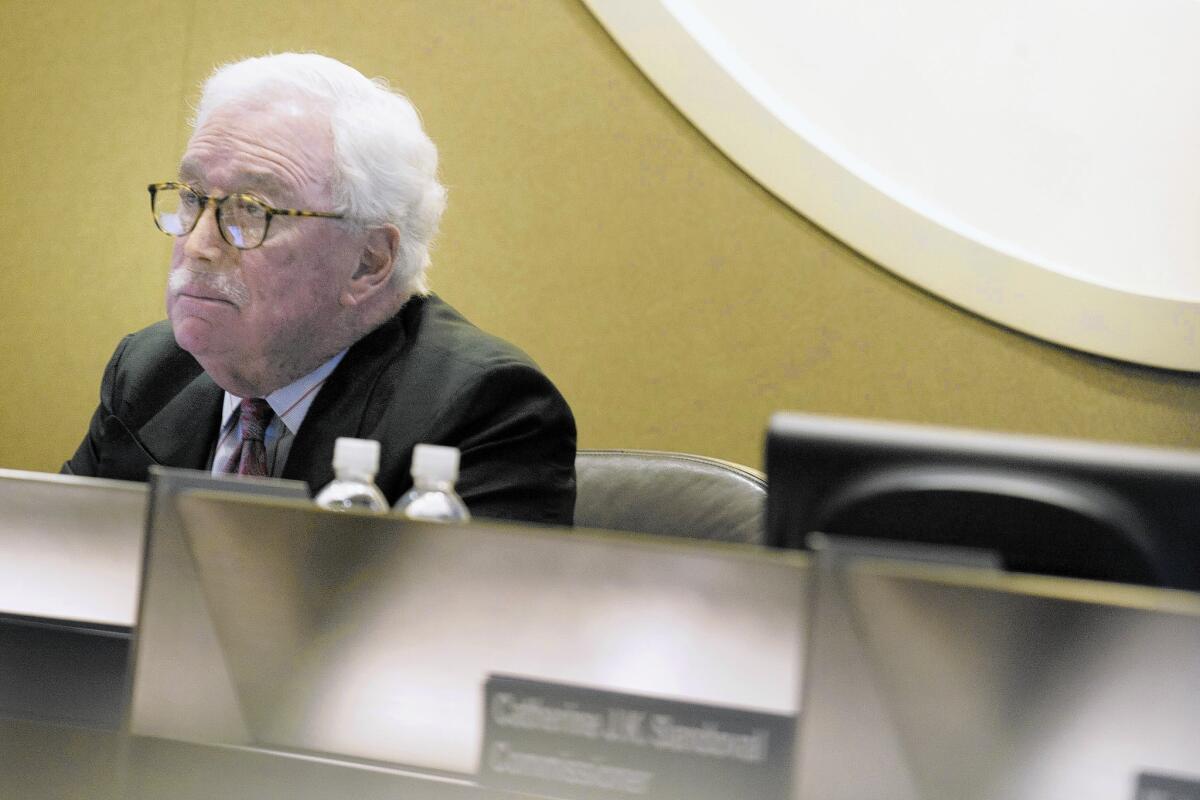Emails show close ties between state regulators and utility executives

Public Utilities Commission President Michael Peevey held a private dinner party for two executives of Pacific Gas & Electric over Memorial Day weekend in 2010, according to a PG&E email.
Over Memorial Day weekend in 2010, one of California’s most powerful regulators hosted a small dinner party at his vacation home on the rugged Sonoma County coast for two top officials at Pacific Gas & Electric Co.
The host was Michael Peevey, a former utility executive who is now the president of the state Public Utilities Commission, which oversees scores of regulated companies, notably PG&E.
The guests were a power couple themselves: Brian Cherry was PG&E’s vice president for rates and regulations, and his wife, Sara, is the vice president for investor relations.
The next night, in a lengthy email to his boss, Cherry described the dinner as “social,” but noted that “we did delve into some work matters” while drinking “two bottles of good Pinot.”
The memo went on to recount at least half a dozen discussion items with direct financial effect on PG&E, including renewable energy, rate increases and a political campaign to defeat a ballot measure that sought to undermine the state’s program for curbing climate change.
Cherry’s lengthy dinner memo was among emails released this week by PG&E when it disclosed that they are part of an investigation by federal prosecutors into the utility and its relationship with the PUC. Virtually every aspect of the utility’s vast operations in Northern and Central California is regulated by the PUC.
Cherry and two other top utility executives have been fired. Peevey’s chief of staff has resigned her post and been reassigned within the PUC. Critics are calling for Peevey’s resignation, and Gov. Jerry Brown recently returned $9,000 in campaign contributions from PG&E employees.
Meanwhile, PG&E itself has been indicted on federal criminal charges of negligence and obstruction of justice in a case stemming from the September 2010 explosion of a natural gas transmission line. The blast killed eight people and leveled a neighborhood in the San Francisco Bay Area bedroom community of San Bruno. The utility has pleaded not guilty.
The emails have come under attack from critics who say they point to a “cozy relationship” between Peevey and other PUC officials and utility executives.
Cherry’s dinner memo is evidence that the PUC “is acting as the personal assistant to the largest public utility monopoly in the state of California and against the interest of the people it is supposed to represent,” San Bruno Mayor Jim Ruane said.
Peevey has defended the PUC’s conduct throughout and dismissed the Cherry dinner memo as a one-sided “interpretation of events from the perspective of a PG&E employee.”
For its part, PG&E said the memos released this week speak for themselves.
“They were absolutely inappropriate,” communications chief Keith Stephens said. He noted that Cherry and his boss have been fired and that the utility had taken a number of other actions to ensure that such violations of rules against such communications “don’t happen again.”
On Wednesday afternoon, the PUC unveiled new rules requiring most top agency officials to report in writing their communications with companies regulated by the agency. Commissioners and their immediate aides have also agreed to voluntarily comply.
Peevey, a former president of Southern California Edison Co. in the 1990s, is at the vortex of attacks on the PUC by lawmakers, consumer advocates and governmental watchdogs.
At 76 and near the end of his second six-year term, he is the longest-serving commission president and one of its most controversial.
Peevey and his wife, Democratic state Sen. Carol Liu, own a home in La Cañada Flintridge. They also own a condominium on Lombard Street in San Francisco and the vacation home in the community of Sea Ranch.
Although his coastal retreat offered an ideal setting for a spring holiday weekend dinner, Cherry’s dinner email showed that much of the conversation focused on business.
According to Cherry, Peevey strongly suggested that PG&E contribute more than $1 million to a political campaign to defeat Proposition 23. The ultimately unsuccessful November 2010 ballot measure, backed by oil companies and other business groups, sought to suspend the state’s program for curbing global warming.
Peevey, a staunch defender of California’s landmark global warming law, known as AB 32, “stated very clearly that he expects PG&E to step up big and early in opposition to the AB 32 ballot initiative,” Cherry wrote. The memo went to his boss, Thomas Bottorff, senior vice president for regulatory relations, who was fired along with Cherry.
“Mike said … we need to spend at least $1 million,” Cherry wrote. The company later contributed $500,000 to the No on 23 campaign, according to Maplight.org, a nonpartisan campaign finance information service.
Peevey also suggested that PG&E and two other utilities — Southern California Edison and San Diego Gas & Electric Co. — each contribute $100,000 for a January 2011 celebration of the PUC’s centennial, the email said. “The amount is steep because the Committee expects to spend $150k or so and use the rest to fund other future Commission events that the state is unwilling to fund,” Cherry wrote.
Peevey noted that he encouraged many “individuals and entities” to contribute to the No on 23 campaign. He said a Fair Political Practices Commission investigation found no irregularities in the fundraising for the centennial celebration.
Other issues discussed at the Sea Ranch dinner party included approval of a contract to buy electricity from a proposed power plant, a pending PG&E request for a rate hike increase, the utility’s negative public relations image and its future commitments to purchasing more climate-friendly renewable power.
“Mike wants to know the direction we are headed as a Company … and our communication strategy for getting back in the public’s good graces,” Cherry wrote.
Ruane, San Bruno’s mayor, has called for Peevey’s ouster. On Thursday, he plans to join state Sen. Jerry Hill (D-San Mateo) and San Carlos Mayor Mark Olbert to ask for Peevey’s removal by the Legislature if he is reappointed by Brown.
At a news conference this week on the steps of the PUC’s San Francisco headquarters, Ruane said that the latest batch of emails
released by PG&E proves “beyond a doubt that collusion — and possibly — corruption has occurred.”
Twitter: @MarcLifsher







